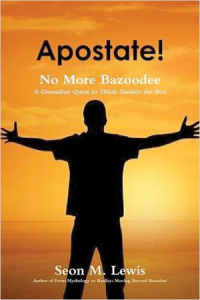Apostate! No More Bazoodee: A Grenadian Quest to Think Outside the Box

BOOK BY SEON M. LEWIS
LULU PUBLISHING, 2015
196 PP.; $15.00
The Caribbean has a ripe history of humanism and skepticism. Great humanists like the writer and theorist C. L. R. James, anthropologist J. A. Rogers, Harlem Renaissance poet Claude McKay, and psychiatrist Frantz Fanon all hail from the Caribbean, and organized humanist groups have been established in Haiti, Jamaica, Trinidad and Tobago, the Netherlands Antilles, and other nations.
Seon M. Lewis hails from Grenada and is involved with the Caribbean Atheists and other groups. His first book, From Mythology to Reality: Moving Beyond Rastafari (2012), was a critique of Rastafarianism from a Caribbean humanist perspective.
In his latest work, Lewis discusses Grenada’s history, politics, religious culture, and educational system, and the need for the nation to embrace a secular humanist perspective informed by a methodology rooted in skeptical inquiry.
Lewis informs readers that the word Bazoodee, as used in Grenada, means “stupidity” or “evil.” He discusses the many ways in which religion dumbs down the culture and reinforces sexism, homophobia, and so on.
This book is also a response to the claim that atheists cannot be good people, and that religious criticism should be actively discouraged. While most U.S. voters wouldn’t support an atheist even if she or he were highly qualified, nontheists in Grenada have even greater challenges. Lewis quotes from the nation’s 2013 International Religious Freedom Report: “Grenada’s Criminal Code prohibits written blasphemous, vulgar language” and “conviction of such an act carries up to two years of imprisonment.” Lewis doesn’t write that anyone in Grenada has been recently convicted of blasphemy. However, merely having such an archaic law on the books can have a chilling effect on free expression.
Lewis saw a need to come out of the closet himself as a secular person and realizes the need for humanist role models in Grenada and throughout the Caribbean. He’s interested in creating a safe space for likeminded thinkers. Moreover, he believes it’s necessary to take a courageous stand against the religiously inspired sexism and homophobia that cause so much misery in that part of the world.
Lewis notes that in Grenada, men are supposed to be in charge of women and male authority must never be questioned. As a result of such a mindset, many Grenadian women experience domestic abuse at the hands of the domineering men in their lives. And while many Grenadian religionists acknowledge that the abuse of women is a serious problem throughout society, many of them don’t acknowledge the fact that religion contributes to the problem.
Lewis cites the Grenadian saying: “If you are not a Christian, then you must be a beast.” Yet he does a superb job of defending secular ethics and critiquing religious morality: he discusses the Divine Command Theory (if God commands a certain kind of behavior, we must carry it out), the Euthyphro dilemma (is an action good because the gods command it, or do the gods condone an action because it is good in itself?), Natural Law theory, and so forth.
Especially fascinating is Lewis’s discussion of Grenadian beliefs in zombies, demons, flying vampires, and so on. Chapter four (“In the Clutches of Zombies”) goes into detail about how prevalent these beliefs are throughout the nation, being embraced by young and old alike.
Lewis, a former Rastafarian, also embraced a black-centered religion known as Nuwaubianism. The word Nuwaubu is derived from Nubia, an ancient kingdom neighboring Egypt. The author writes: “The Nuwaubian sect can be described as a nationalistic theistic movement that promotes a type of esoteric cosmology.” The group’s belief system comes from other religious and quasi-religious black nationalist outfits such as the Nation of Islam, the Five-Percent Nation, and the Moorish Science Temple of America. It also draws upon beliefs from many other ancient and modern religions. Some Nuwaubians worshipped their leader as a god.
Eventually, Lewis chucked it all for a rational, skeptical, and secular lifestance. His wife introduced him to the Infidel Guy (aka Reginald Finley Sr.) and today he is extremely well-read in humanist, skeptical, and scientific literature, which shows in this well-researched book. Lewis has become a courageous spokesperson for humanism, and he is working hard to spread a humanist worldview throughout the Caribbean, a most worthwhile endeavor.
